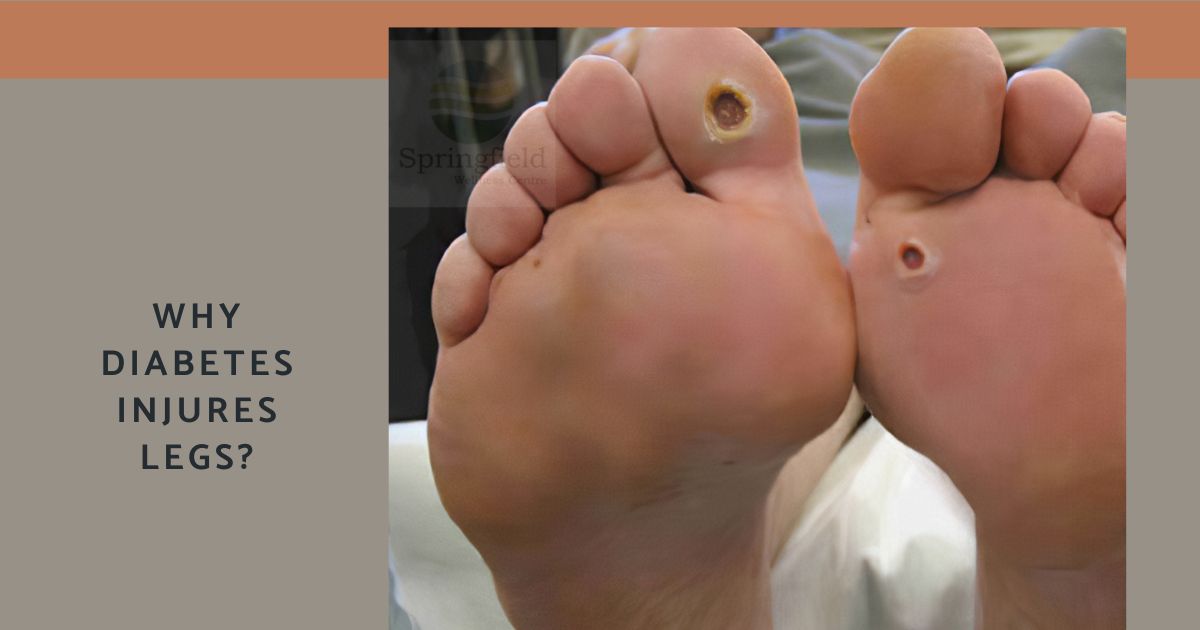Why Diabetes injures legs?
We have often seen people with diabetes having injuries in their legs. Some of them are unlucky to get their legs amputated too. Why does diabetes injure the legs? What are the reasons? Here are some insights into a condition called Diabetic Neuropathy.
What is Diabetic Neuropathy?
It is a type of nerve damage instigated as a result of diabetes that has become complicated. Not everyone with diabetes gets this condition. But one estimate says that as high as 50% of the diabetic are at risk of developing diabetic neuropathy. Higher levels of blood glucose can injure nerves and they more often end up damaging nerves in the legs and feet.
There are four different types of diabetic neuropathy based on which body organs’ nerves have been affected.
- Peripheral Neuropathy
- Autonomic Neuropathy
- Proximal Neuropathy
- Mononeuropathy
Symptoms of Diabetic Neuropathy
- Pain and numbness in the affected legs, feet and hands, numbness to pain and temperature changes, a burning feeling, muscle weakness, extreme sensitivity are some of the symptoms common to peripheral neuropathy.
- A drop in blood pressure when patients get up from a lying position causing dizziness, low or no awareness to drop in blood glucose level (hypoglycemia), bowel problem, a feeling of fullness accompanied by loss of appetite, sex related issues like vaginal dryness or erectile dysfunction are some of the symptoms common to autonomic neuropathy
- Pain in the butt region, hips or thighs, weak thigh muscles, shrinking thigh muscles, mild chest pain which actually is a pain originating from the upper abdominal wall, are some of the symptoms common to proximal neuropathy.
- Problems in a specific single nerve is the hallmark of mononeuropathy and based on the specific nerve the symptoms develop. A feeling of numbness or tingling in the hands or feet, paralysis to one side of the face, weakness in the hands which can make the patient to drop things, being unable to lift the foot drop region of the foot are some of the symptoms common to Mononeuropathy
If the patient has any of the above mentioned symptoms or more importantly any wound or injury that is not healing, it is time to consult a doctor immediately for the presence of diabetic neuropathy. More often, many patients end up diagnosing the presence of diabetes only after they have consulted a doctor for an injury or wound that is not healing.
Treating Diabetic Neuropathy
Diabetic neuropathy has no known cure. The only step that can be done is to slow the progression of the disease by controlling the blood sugar levels and leading a healthy lifestyle by incorporating physical exercises and proper diet. Keeping the blood glucose levels between 80 mg/dl and 130 mg/dl before meals and keeping it below 180 mg/dl two hours after meal are the recommended blood glucose levels to slow the progression of diabetic neuropathy.
The parallel goals of the treatment would be to manage pain and effectively manage the complications caused. Pain is managed by prescription drugs that can calm the nerves. Managing complications caused is done by weighing the organs affected. So specific treatment to issues like digestive problems, urinary tract problems, sexual dysfunction, etc are taken up individually.
Generally speaking, diabetes has to be managed effectively so that it does not lead up to a stage where it causes diabetic neuropathy. As said earlier in the post, the best way to manage diabetes is to make lifestyle changes. What is consumed matters a lot when the patient has diabetes. Generally foods rich in simple carbohydrates like white bread, pastry items, desserts and sweets, junk foods have to be completely avoided. The intake of carbs in the form of complex carbs like millets should be encouraged. People with uncontrollable blood glucose levels despite the medication they take can try other options like LCHF diet or Metabolic surgery.

